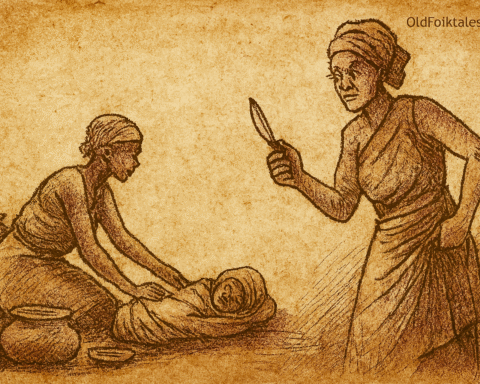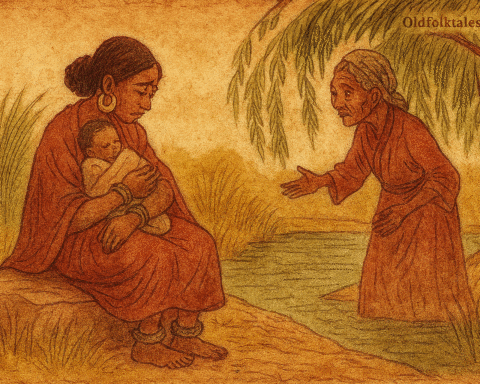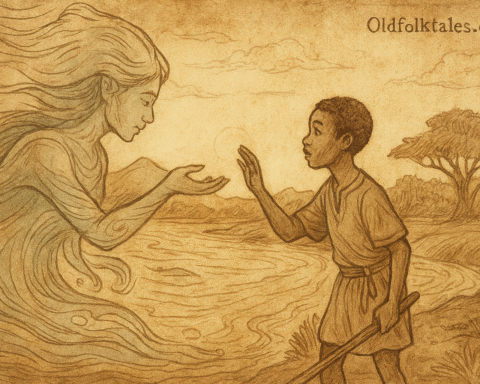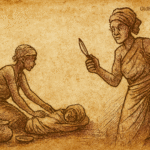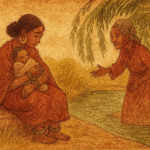Long ago, in a land of rivers, forests, and timeless songs, there lived a powerful king. Though he commanded warriors, ruled over vast lands, and presided over the affairs of his people, his greatest joy came not from wealth or power, but from a small, delicate creature, the ’nsiat bird.
This bird was unlike any other. Its feathers glimmered in shades of bronze and emerald, and its voice carried melodies so pure that they could quiet storms in the heart. Whenever the ’nsiat bird sang, its music rose through the rafters of the king’s great hall and drifted into the open courtyards. Courtiers and villagers alike would pause to listen, for the song seemed to weave peace into the air. Yet it was the king himself who loved it most.
Each morning, before matters of governance began, the king would sit by the window of his chamber and listen. The bird’s song became his comfort, his joy, and—though he did not yet realize it, his weakness.
The Stranger’s Request
One day, as the sun burned high above the marketplace and drums echoed from afar, a stranger entered the kingdom. His appearance was unfamiliar: his garments were travel-worn, his eyes sharp, and his voice carried a tone both courteous and insistent.
He approached the palace gates and asked for an audience with the king. When he was admitted into the hall, he bowed deeply and, after a moment’s pause, made his request.
“Oh great king,” the stranger said, “I have heard of the bird you keep, the ’nsiat whose song surpasses all music. Grant it to me, I pray, for I have journeyed far just to behold and possess it.”
The court fell silent. The king, who loved his people and often gave generously, was taken aback. To part with the bird was unthinkable. Its song was more than mere music; it was his soul’s companion.
With steady voice, the king replied, “Stranger, I grant many things, but this bird is my treasure. I cannot part with it. Ask for gold, ask for land, but not the ’nsiat.”
The stranger’s face darkened. Though he smiled outwardly, his eyes gleamed with dissatisfaction.
The Deed of Betrayal
That night, when the palace had quieted and the moon cast its silver watch over the land, the stranger crept into the royal chambers. Silent as a shadow, he approached the cage where the bird rested. Its feathers shimmered faintly under the pale light, and it stirred, as though sensing danger.
Before dawn could break, the stranger committed his cruel act. He seized the bird and, with no mercy, struck it dead. Then, swift as a thief of wind, he fled from the palace and disappeared into the night.
When the morning came, the king rose, as was his custom, to hear the bird’s song. But the hall was silent. He approached the cage and found the lifeless form of the creature he cherished above all else.
A cry of anguish tore from his throat. The courtiers gathered, the guards searched in vain, but the deed was done, the ’nsiat bird was gone forever.
The King’s Sorrow
From that day, the king’s spirit waned. No counsel could soothe him, no feast could delight him, and no music of drums or flutes could fill the void. He wandered the palace gardens, speaking softly to the trees as though hoping the bird’s melody might echo back to him.
His people grieved to see their ruler fading. He who had once been strong and resolute now sat in silence, staring at the empty cage. Within weeks, sorrow weighed so heavily upon him that he fell ill. And not long after, his grief overcame him completely, and he died, leaving behind a kingdom steeped in mourning.
Moral of the Story
Do not set your heart too strongly upon any one possession, no matter how beautiful or cherished. Love should bring joy, not chains of despair. For when the heart clings too tightly, it may shatter in loss.
Knowledge Check
1. Who is the central character in The King and the ’Nsiat Bird?
The central character is the king, whose deep love for the ’nsiat bird leads to his sorrow.
2. What is special about the ’nsiat bird in this Efik folktale?
The ’nsiat bird is treasured for its beautiful and soothing song, which brings peace to the king and his people.
3. Why does the king refuse the stranger’s request for the bird?
The king refuses because the bird is his most cherished possession, more valuable to him than gold or land.
4. What action does the stranger take after being denied the bird?
The stranger kills the bird and flees the palace, leaving the king heartbroken.
5. What lesson does this folktale teach about attachment?
The story teaches that excessive attachment can lead to great suffering, and one must not cling too tightly to worldly possessions.
6. What is the cultural origin of The King and the ’Nsiat Bird?
The tale originates from the Efik people of Nigeria.
Source: Nigerian Folktale

